
No. 12, 2024 | 23 August 2024
Go to:
From FRSA's Executive Director
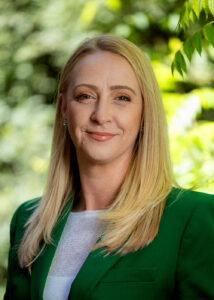
This week marked the release of the Domestic, Family and Sexual Violence Commission’s inaugural Yearly Report (see more below). I had the opportunity to join sector colleagues in attending the Domestic, Family and Sexual Violence Commissioner’s address on the inaugural report on progress of the National Plan to End Violence against Women and Children 2022-2032 at the National Press Club on Wednesday.
Needless to say Commissioner Micaela Cronin did concede that marking progress on a fairly new Plan in the absence of fulsome datasets was not a realistic objective for this year’s Report. However, she was firm in her view that commitment to the National Plan and the commitment to achieving change across the myriad of stakeholders was well positioned for future objectives.
A lot was made in the media of the Commissioner’s comment that violence against women and children in Australia should be treated with the same degree of seriousness as terrorism. Out of context – this might seem extreme but what it is pointing to is the need to recognise the urgency, priority and resources that must be invested to ensure victim survivors (including children) are safe. Her message about ‘keeping eyes on men’ was also very strong as was the narrative about this being an issue that needed men to be involved – men needed to step up. I was struck, therefore, that while there were a small number of men in the room at the Commissioner’s address, all political leaders in attendance were women and only one out of the 8 or so journalists asking questions was a man. Radical change is required if we are going to bring men along on this journey.
Today, Robyn and I joined Relationships Australia and Uniting Vic.Tas on a panel to give evidence to the Parliamentary committee running the Inquiry into family violence orders. The inquiry has a particular focus on the intersection between family violence orders and the family law system and it was a great opportunity to share reflections from FRSA members on these points of intersection from a family law services perspective. We made an initial submission to the inquiry in July and yesterday lodged a supplementary submission, which provides more detail on these member reflections. As soon as the committee has formally accepted that second submission, we’ll make it available on our website.
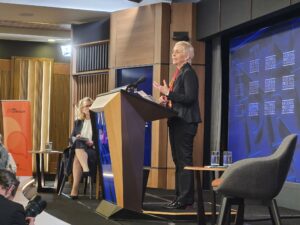
Alongside family violence, the other service system with which the Family and Relationship Services sector has a strong connection with is the Child Protection System. I take this opportunity to remind readers that National Child Protection Week 2024 is coming up 1-7 September. There’s more information about the week and how to get involved below.
Kind regards,
Jackie Brady
FRSA Executive Director

Register for the second FRSA First Nations lunchtime webinar!
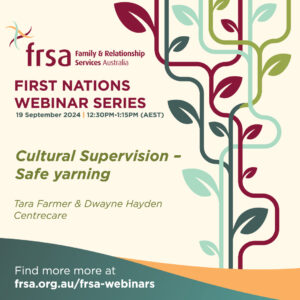 Register today for the second webinar in our First Nations focus on Family and Relationship services series, Cultural Supervision – Safe yarning presented by Tara Farmer and Dwayne Hayden from Centrecare on Thursday, 19 September 2024 at 12:30PM-1:15PM (AEST)
Register today for the second webinar in our First Nations focus on Family and Relationship services series, Cultural Supervision – Safe yarning presented by Tara Farmer and Dwayne Hayden from Centrecare on Thursday, 19 September 2024 at 12:30PM-1:15PM (AEST)
The presentation will go through how Cultural Supervision has been implemented within Centrecare’s organisation to help develop, promote and embed cultural safety and understanding. With Cultural Lead positions established to support supervision for staff in identified programs across the Perth metro and regional areas including the Goldfields and South-West region of Western Australia.
Cultural Supervision offers a safe yarning space without judgement, staff can share and reflect on practices to increase or better engage with families, individuals, and the community as a whole; enabling practices to be embedded in a culturally safe and respectable manner, throughout their various fields.
View the full webinar schedule below:
| Date and Time | Webinar | Presenter |
|---|---|---|
| Thursday, 19 September 2024
12:30PM-1:15PM AEST |
Cultural Supervision – Safe yarning | Tara Farmer & Dwayne Hayden, Centrecare |
| Wednesday, 16 October 2024
12:30PM-1:15PM AEDT |
Message Stick Action Research Project | Jack Archibald & Lachlan Skinner, Interrelate |
| Wednesday, 30 October 2024
12:30PM-1:15PM AEDT |
Family-Led Decision Making driving child protection reform in South Australia | Megan Waters, Relationships Australia South Australia |
| Wednesday, 13 November 2024
12:30PM-1:15PM AEDT |
Aboriginal Community Education Officer Engagement | Lorelle Bennett & Jayde Milburn, Anglicare SA |
| Wednesday, 27 November 2024
12:30PM-1:15PM AEDT |
Developing Cultural Competence and Cultural Safety in Katherine, NT | Eugenie Collyer, The Smith Family |
Strategic Leadership Forum 2024
Registrations for the FRSA Strategic Leadership Forum 2024 are now open!
The dates are set for 10-11 September 2024 in Canberra. Click the button below to access the registration website. This is an FRSA Members only event.
We are working to build a program that provides CEOs and Senior Managers with the most relevant and most contemporary news and information of importance to the Family and Relationship Services sector.
Believe it or not – we are already in ‘pre-election’ mode – with the earliest date an election can be held (half-Senate and House of Representatives) being 3 August 2024 and the latest being 17 May 2025. So – it is important for the sector to be on the front foot with our political leaders and the Government agencies in delivering vital information about the ongoing value and importance of the Family and Relationship Services Sector.
To assist you in making your arrangements to attend whilst we finalise the program:
Day 1: Tuesday, 10 September 2024
Location: National Portrait Gallery, Parkes Way, Canberra
Start time: 10am
End time: 5pm
Networking event – 5.30-6:30pm (venue – TBA)
Day 2: Wednesday, 11 September 2024
Parliamentary Briefing Day – small group visits with Parliamentarians
Location: Australian Parliament House
Start time: 9am
End time: 2pm (Dependent on when your final meeting is scheduled)
Access to the event details including the event program, speaker information and accommodation will be available on the FRSA Members Only Event page.
Please contact events@frsa.org.au for the password to the FRSA Member’s Only Event page.
Meet the FRS Sector!
In this week’s video we spoke to Nicki Boxtel, Clinical Coordinator at Anglicare WA in Western Australia.
FRSA Conference Plenary recordings now available
The video recordings of the keynote presentations and panel discussion from the FRSA Conference, in May are now all available via FRSA’s YouTube channel. This includes keynotes from:
- Amanda Rishworth, Minister of Social Services
- Sarina Lacey and Dennis McCarthy, The Centre for International Economics (the CIE)
- The Hon Mark Dreyfus KC MP, Attorney-General
- Tania Farha, Safe and Equal
- Grace Tame
Domestic, Family and Sexual Violence Commission – Yearly report tabled
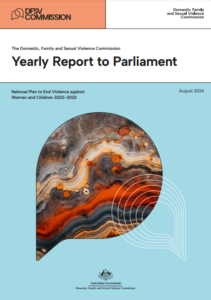 The Domestic, Family and Sexual Violence Commission’s inaugural Yearly Report to Parliament was tabled in Parliament on 21 August.
The Domestic, Family and Sexual Violence Commission’s inaugural Yearly Report to Parliament was tabled in Parliament on 21 August.
Delivered one year after the release of the First Action Plan 2023-2027 and the Aboriginal and Torres Strait Islander Action Plan 2023-2024, the report tracks progress of the National Plan to End Violence against Women and Children 2022-2032.
The Commission’s report is informed by extensive engagement with a range of stakeholders, include Australians with lived experience with gender-based violence, specialist sector organisations and practitioners, researchers, the health sector, police, and a range of other sources of evidence. In subsequent reports, information and data collected under formal reporting mechanisms will enable a more comprehensive assessment of progress by the Commission.
The report identifies key areas of focus for consideration of governments:
- Building on recognition of the critical role of lived experience in policymaking
- Addressing the overload on services and systems
- Ensuring men are a part of every aspect of ending violence
- Supporting workforce capability development.
The Yearly Report is available here.
Families Report: Diversity of families in Australia not being recognised in Government decisions
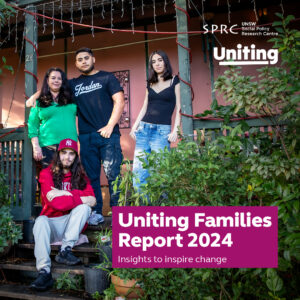 Uniting NSW.ACT launched its new flagship Uniting Families Report earlier this week.
Uniting NSW.ACT launched its new flagship Uniting Families Report earlier this week.
It’s the first in a 10-year series of reports that seeks to delve into the reality family life in Australia, foster a deeper understanding and appreciation of diversity within our communities and explore what it means to raise children and young people.
Uniting NSW.ACT CEO, Tracey Burton said, “The traditional image of the nuclear family – mother, father and two children – permeates our cultural understanding of family life. This report responds to the need for a more nuanced view, challenging current conventions and celebrating the many different ways people create family when raising children.”
The Uniting Families Report was developed by the UNSW Social Policy Research Centre in partnership with Uniting NSW.ACT and has significant public policy implications for State and Federal Governments.
Key findings:
- Failing to honor the diversity of family structures means we fail to understand and support families.
- The cost-of-living pressure is felt more strongly by those that are not in couple parent families.
- Some family types are more likely to be affected by the current rental crisis and lack of affordable housing supply than others. The experience of having insecure housing is more familiar to sole parent and step and/or blended families.
- Families with young children rely on childcare and family members in different ways. Our current Child Care subsidies benefit couple families and single mothers most but can make things more complex for other family types (such as step-blended families).
- First Nations Families have family structures that population data sets often overlook and that social services struggle to understand. This contributes to problems like over-representation of First Nations children in out-of-home care.
- Parental support and financial situation influences young peoples’ engagement in education and employment. Young people growing up in foster care have the lowest rate of participation of any family type.
- Family types which are most likely to be providing care for people with long-term health conditions and disability are on average more likely to be already struggling to cope financially.
ABS releases 2023 statistics on marriage and divorce
 The Australian Bureau of Statistics (ABS) has released statistics on marriage and divorce in Australia for 2023.
The Australian Bureau of Statistics (ABS) has released statistics on marriage and divorce in Australia for 2023.
There were 118,439 marriages registered in Australia in 2023, down from the record high of 127,161 marriages registered in 2022 but well above COVID-19 pandemic related lows in 2020 and 2021.
48,700 divorces were granted in Australia in 2023, down 1.1% from the 49,241 divorces granted in 2022.
More information is available here.
Child Poverty in Australia Report
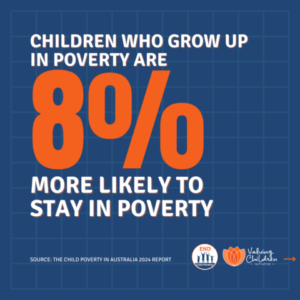 The Child Poverty in Australia 2024 report by Bankwest Curtin Economics Centre has been released.
The Child Poverty in Australia 2024 report by Bankwest Curtin Economics Centre has been released.
The report compared the life outcomes of young people who grew up in poverty, exposing the scarring effect on life outcomes.
Following their paths through life over 22 years, the data shows:
- Child poverty in Australia has risen significantly as a result in the years since COVID.
- Children who experience poverty and housing stress are significantly more likely to suffer nervousness or feel unhappy with their lives for up to ten years after leaving home.
- Children are 8 per cent more likely to stay in poverty
- Children are 11 per cent less likely to be employed
- Rising housing costs hit low-income families harder = with rents increasing by 17.8% for lower quartile rentals between 2020-2022.
- Many families are forced to move to more affordable housing, often resulting in dissatisfaction and psychological distress.
- Another 102,000 children were plunged into poverty between 2021 and 2022.
- 3.7 million people and 823,000 children living below the poverty line
Emergency cash payments found to have positive impact on vulnerable young Australians
 A University of Sydney study has found that Australian government emergency cash payments, like JobKeeper, significantly helped young adults with pre-existing mental health disorders during the pandemic.
A University of Sydney study has found that Australian government emergency cash payments, like JobKeeper, significantly helped young adults with pre-existing mental health disorders during the pandemic.
The study investigated the impact of cash transfer payments (specifically JobKeeper and JobSeeker Supplement) provided during the COVID-19 pandemic and found young Australians with neurodiversity and/or mental health conditions who received JobKeeper coped better through the pandemic than those who did not receive JobKeeper.
The researchers used data collected by Growing Up in Australia: The Longitudinal Study of Australian Children, to examine how well the participants felt they were managing during the stress of the pandemic.
Of the 902 participants in the study, 18.9 percent self-reported being neurodivergent and/or having a mental health disorder either in the form of anxiety, ADHD, depression or autism.
Results showed that those who received JobKeeper had higher levels of adaptive coping than those who did not receive JobKeeper. Coping can be described as using mental and practical strategies to successfully manage a challenging situation.
The study also found that for individuals without prior mental health issues, being male and having strong family support were both linked to better coping during the pandemic. Those with strong family bonds were 88 percent more likely to cope well compared to those with weak family bonds. Read the full report.
‘Help way earlier!’ – transforming child justice report released
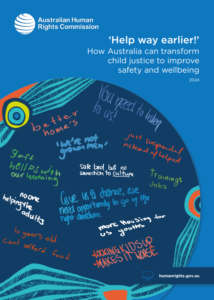 The National Children’s Commissioner, Anne Hollonds, has just released a major new report that calls for significant changes to how our federal, state and territory governments approach child justice and the wellbeing of children who are or who are at risk of being caught up in the criminal justice system. The report includes the voices of children and their families, and stakeholder submissions, interviews and roundtables.
The National Children’s Commissioner, Anne Hollonds, has just released a major new report that calls for significant changes to how our federal, state and territory governments approach child justice and the wellbeing of children who are or who are at risk of being caught up in the criminal justice system. The report includes the voices of children and their families, and stakeholder submissions, interviews and roundtables.
Tabled in Federal Parliament on 20 August, the report – Help way earlier!’: How Australia can transform child justice to improve safety and wellbeing – sets out a suite of recommendations designed to help vulnerable children thrive and keep the community safe. The report calls for coordinated action across the federation through measures such as a National Taskforce for reform of child justice, a federal Minister for Children, a Ministerial Council for Child Wellbeing and a National Children’s Act.
Despite evidence of social disadvantage being the root cause of offending behaviour, policy responses are centred on policing, stricter bail laws, and incarceration. In many cases, these responses worsen the trauma and inequality driving children’s contact with the justice system in the first place. Commissioner Hollonds said: “Our communities will not be safer if we just keep punishing and locking up children who have complex needs caused by poverty, homelessness, disability, health and mental health issues, domestic, family and sexual violence, systemic racism and intergenerational trauma.”
The report argues that Australia needs transformational change that puts child wellbeing first. This means reform based on evidence and human rights.
The report, executive summary and a video recorded by Commissioner Hollonds to report back to the 150 children and young people the Commissioner spoke to are available here.

Family Law Amendment Bill 2024 introduced to Parliament
The Government introduced the Family Law Amendment Bill 2024 into Parliament on 22 August.
This Bill builds on the Government’s family law reforms which came into effect on 6 May 2024. The Family Law Amendment Act 2023 and the Family Law Amendment (Information Sharing) Act 2023 established new information sharing arrangements to protect against family safety risks and put the best interests of children at the centre of all parenting decisions in family law matters.
This Bill seeks to make the division of property and finances safer, simpler and fairer for separating families, especially where family violence is present. The Bill would:
- specify the approach that a court will take when deciding the division of property and finances, making the law clearer for all parties
- ensure the economic impact of family violence is considered where relevant as part of dividing property and finances
- ensure that the care and housing needs of children are considered in financial and property decisions
- ensure financial information is disclosed at the earliest opportunity to promote the early resolution of disputes
- expand the court’s ability to use less adversarial approaches in all types of proceedings, not just for children’s matters, supporting parties to safely raise family violence risks and ensuring the safe conduct of proceedings.
FRSA made a submission to the Attorney-General’s Department’s consultation on the Exposure draft of the Bill in 2023.
National Redress Scheme inquiry – last call for submissions
Submissions to the parliamentary inquiry into the operation of the National Redress Scheme will close on 2 September 2024. The committee is expected to finish its inquiry in October 2024.
The National Redress Scheme was established in response to the Royal Commission into Institutional Responses to Child Sexual Abuse. The Committee’s role is to oversee implementation of the Royal Commission’s redress-related recommendations.
More information on the inquiry, including a discussion paper released in 2022, is available on the committee’s website.
Inquiry into Family Violence Orders – FRSA submission
FRSA’s submission to the parliamentary inquiry into family violence orders has been published on the inquiry website and is also available on FRSA’s website.
The Standing Committee on Social Policy and Legal Affairs is inquiring into how to provide better access for victim-survivors in the family law system to Family Violence Orders (FVO) and the effective enforcement of those orders.
FRSA will give further evidence at a public hearing on Friday 23 August 2024.

EACH take their 50 year celebration on the road
How can you best celebrate 50 years of providing services to the community, when you have more than 1500 staff working across 58 locations in four states and one territory?
EACH has figured out just how to do that, by painting a bus purple and hitting the road. During August teams of EACH employees have been driving and riding on the 50 Years of EACH bus down the eastern seaboard of Australia from Queensland to Victoria.
So far they’ve stopped at EACH’s locations in Ipswich, Coffs Harbour, Port Macquarie, Campbelltown, Goulburn and Kingston.
Congratulations on 50 years EACH! See how the idea came about in the video below:
View this post on Instagram
Centacare South West NSW wins at Golden Crow Awards
 Congratulations to the team at Centacare South West NSW on winning at this year’s Golden Crow Awards.
Congratulations to the team at Centacare South West NSW on winning at this year’s Golden Crow Awards.
They won the Employer of Choice award, which recognises a business that has implemented strategies and initiatives to create a stimulating and supportive workplace environment.
CEO, Annemaree Binger also won Outstanding Business Leader. She said, “It’s an honour to lead such a compassionate, hardworking team. I thank everyone at Centacare for making my job something I’m proud to stand behind—both morally and professionally. Here’s to many more achievements.”
The Golden Crow Awards recognise growth, entrepreneurship and celebrate business success in the business community of Wagga Wagga.
Livable farewells CEO
 On 26 July, Livable said farewell to CEO Daniel Becker after five years.
On 26 July, Livable said farewell to CEO Daniel Becker after five years.
During his time, his leadership lead the organisation through transformation and expansion.
“We are incredibly grateful to Daniel for his unwavering dedication and exceptional leadership during his five-year tenure. Daniel has led Livable to numerous milestones, including our transition from CRANES to Livable, securing the organisation’s financial sustainability and overseeing its growth into new regions such as Coffs Harbour and Port Macquarie,” said Livable’s Board of Directors Chair, Stephen Avery.
“His strategic vision and commitment to our mission have significantly positioned Livable as a leader in providing exceptional care and support services to our participants and community members in the Northern NSW and Mid North Coast regions.”
Daniel has taken up the role of CEO at Many Rivers Regional Housing. FRSA wishes him all the best for the future.

National Child Protection Week 2024
 National Child Protection Week is coming up 1-7 September 2024. The week continues to champion the message ‘Every child in every community needs a fair go’. This year that message is complemented with the theme, ‘Every conversation matters’.
National Child Protection Week is coming up 1-7 September 2024. The week continues to champion the message ‘Every child in every community needs a fair go’. This year that message is complemented with the theme, ‘Every conversation matters’.
Conversations are powerful tools to keep children and young people safe and well. Conversations can help us understand issues, craft solutions, value community knowledge, and build the brains and social connections of children and young people.
The week aims to bring together partners to focus on addressing the significant harms being experienced by children in Australia. By working collectively to change the trajectory of these children and families, we can reduce the number of children who may come in contact with the child protection system.
Find out more information about the week, how to get involved and download resources via the NAPCAN website.
Keeping Kids in Mind Official Film Screening
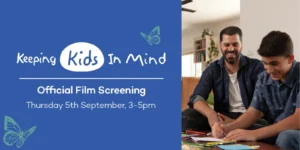 Join the official screening of CatholicCare Sydney’s new Keeping Kids in Mind film at the Bryan Brown Theatre in Bankstown.
Join the official screening of CatholicCare Sydney’s new Keeping Kids in Mind film at the Bryan Brown Theatre in Bankstown.
When: Thursday 5th September
Time: 3:00pm to 5:00pm
Where:Bryan Brown Theatre, Corner of Rickard and Chapel Roads,
80 Rickard Rd, Bankstown NSW 2200
Cost: Free
Keeping Kids in Mind is the only externally evaluated post separation parenting course currently facilitated Australia wide. CatholicCare Sydney has been actively training experienced practitioners to provide this much needed service to parents both online and in person. The course looks at the impact of parental separation through the eyes of children, helping parents to learn and understand the best ways to support their children through these challenging times.
An integral part of their program is bringing in the voices of children to the forefront and to assist parents to understand the impact of ongoing conflict on their children. The Keeping Kids in Mind film has been updated to better represent the diversity of families and real-life scenarios that many parents and children find themselves in when separating. RSVP before 26 August 2024 – Click here to register.
NSW Suicide Prevention Legislation – Sector Survey
Suicide Prevention Australia is undertaking consultations through a survey, on behalf of the NSW Government, concerning the NSW Suicide Prevention Act. This is new legislation the NSW Government is introducing to help prevent suicide.
The NSW Suicide Prevention Act aims to establish a whole-of-government and whole-of-community approach to suicide prevention. It seeks to ensure collective responsibility, accountability, and action towards suicide prevention across government.
This survey asks for feedback on the proposed aims and elements of the new legislation. If you work in the suicide prevention sector, or you are someone with lived experience of suicide, they would very much value your participation in the survey. They also value your participation if you are part of an organisation that works alongside the suicide prevention sector.
Click here to complete the survey. The Survey should take about 10-15 minutes to complete. It closes on 30 September.
If you would like to know more about the new NSW Suicide Prevention Act, you can find more information at this link.
Transformative Online GroupWork Symposium
 Western Sydney University, Interrelate and Relationships Australia NSW are holding a two-1/2-day Transformative Online Groupwork Symposium in April 2025, designed for group workers seeking to enhance their skills and expand their toolbox for innovative online groupwork practice. Social groupwork captures psychoeducational, social action, mutual aid, cultural development and therapeutic groupwork contexts. This Online GroupWork Symposium explores the benefits and challenges of groupwork practice that is occurring online post Covid. Early bird registrations are now OPEN!
Western Sydney University, Interrelate and Relationships Australia NSW are holding a two-1/2-day Transformative Online Groupwork Symposium in April 2025, designed for group workers seeking to enhance their skills and expand their toolbox for innovative online groupwork practice. Social groupwork captures psychoeducational, social action, mutual aid, cultural development and therapeutic groupwork contexts. This Online GroupWork Symposium explores the benefits and challenges of groupwork practice that is occurring online post Covid. Early bird registrations are now OPEN!
Date: Tuesday 15 and Wednesday 16 April 2025
Time: 11:00am to 3:30pm both days
Location: Online via Zoom
The Call for Abstracts for the Transformative Online GroupWork Symposium is now open. They are seeking proposals for:
- 30-Minute Paper Presentations (including Q&A)
- 60-Minute Interactive Workshops
All abstracts need to focus on the research and/or practice of online groupwork. The symposium themes are:
- Engaging diverse communities
- Platform and administration dilemmas in online groupwork
- Opportunities and challenges in online groupwork
- ‘Yarning Down the Line’ – Exploring Aboriginal Online Groupwork
Submission Deadline: Friday 29 November 2024
Click here to submit your abstract. For further inquiries, please contact Dr Neil Hall at N.Hall@westernsydney.edu.au.
Stay tuned for updates on speakers, workshop topics, and registration details. Click here to find out more or contact Andrew King at andrewki@ransw.org.au.
Effective Online Group Leadership Workshop
SUNSHINE CIRCLES – Albury
SUNSHINE CIRCLES – Shepparton
HEY LITTLE WARRIOR – Sale
VIC
Family Dispute Resolution Practitioner (FDRP) – Remote/Flexibile | Mallee Family Care
QLD
Family and Relationships Counsellor – Emerald | CatholicCare Central Queensland
NSW
Family Dispute Resolution Practitioner – FDRP – Penrith | Relationships Australia NSW
Senior Family Dispute Resolution Practitioner – FDRP | Relationships Australia NSW
WA
Coordinator Family Law Services | Anglicare WA
Child Counsellor, FDV | Anglicare WA
NT
Manager Housing Support Services | Anglicare NT
Coordinator (HIPPY) | Anglicare NT
Financial Counsellor/Capability Worker | Anglicare NT
If you have any events you’d like listed on the FRSA Events and Training Calendar or job vacancies you’d like listed on the FRSA Jobs Board, email Communications Officer, Vanessa Lam at communications@frsa.org.au. Please note that posting onto the FRSA website is reserved for FRSA Members only.

Listening to lived experience: what needs to be done to end homelessness in Australia? | Life Course Centre
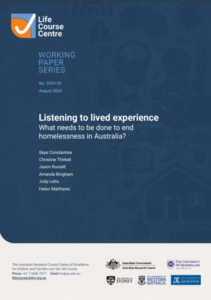 To build a greater understanding of these lived and living experience contributions to the end of homelessness, this study investigates what people with lived and/or living experiences believe needs to be done to end homelessness in Australia.
To build a greater understanding of these lived and living experience contributions to the end of homelessness, this study investigates what people with lived and/or living experiences believe needs to be done to end homelessness in Australia.
Domestic Violence Death Review Team Report 2021-2023 | Government of New South Wales
 This report is the most comprehensive data analyses the Domestic Violence Death Review Team has undertaken to date, presenting detailed findings from over two decades of domestic violence homicides in NSW. It report provides crucial insights to guide policymakers, service providers and advocates in preventing, responding to, and aiding recovery from domestic violence.
This report is the most comprehensive data analyses the Domestic Violence Death Review Team has undertaken to date, presenting detailed findings from over two decades of domestic violence homicides in NSW. It report provides crucial insights to guide policymakers, service providers and advocates in preventing, responding to, and aiding recovery from domestic violence.
Risk assessment approaches in child protection | Child Family Community Australia
This resource sheet summarises risk assessment approaches used by child protection practitioners to assess whether a child is at risk of future maltreatment and to determine whether further investigation or intervention is necessary. It provides information on risk assessment instruments and their strengths and weaknesses and information on risk assessment frameworks or tools used by states and territories in Australia.
The 2024 Australian Youth Barometer | Monash University
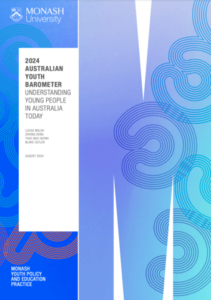 The fourth annual Australian Youth Barometer surveyed over 620 young Australians aged 18–24, and interviewed 30 more, about their experiences with the economy, work, education, health and wellbeing, relationships and participation in civic life. Among these topics, themes emerge: the impact of technology and the role of social media, feelings of belonging and exclusion, financial security (including housing and food insecurity) and the need for governments to offer more support.
The fourth annual Australian Youth Barometer surveyed over 620 young Australians aged 18–24, and interviewed 30 more, about their experiences with the economy, work, education, health and wellbeing, relationships and participation in civic life. Among these topics, themes emerge: the impact of technology and the role of social media, feelings of belonging and exclusion, financial security (including housing and food insecurity) and the need for governments to offer more support.
A new workforce planning platform to support Specialist Homelessness Services and the community and social services sector | Council to Homeless Persons
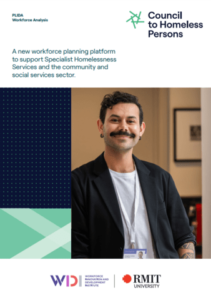 This report looks at the pressures and dynamics affecting those working in Victoria’s specialist homelessness sector and identifies the path forward towards a more supported and sustainable workforce.
This report looks at the pressures and dynamics affecting those working in Victoria’s specialist homelessness sector and identifies the path forward towards a more supported and sustainable workforce.
Resources to support culturally safe service delivery to Aboriginal and Torres Strait Islander peoples | Child Family Community Australia
This resource sheet provides a list of all resources and organisations that can support non-Indigenous practitioners and organisations in the child, family and community sector to provide culturally safe service responses to Aboriginal and/or Torres Strait Islander people, families and communities.
Victorian youth homelessness snapshot 2024 | Melbourne City Mission
The snapshot represents, on a given day in 2024, the reality faced by young people accessing Melbourne City Mission’s homelessness programs and in particular their intersecting experiences of family violence, mental health, and persistent homelessness. Selected macro-economic data is included to create a better understanding of economic context and government spending across these three areas.
Community Compass: A segmentation of Australia’s views and engagement with the community sector | 89 Degrees East, Our Community and the Community Council for Australia
 This report presents findings from a survey of 3,071 members of the Australian community aged 17 years and over that was conducted in February-March 2024. Analysis of 39 diverse attitudinal statements produced six distinct segments who differ in how they think about, value and engage with the community sector. Each segment varies in their attitudes towards the role of the community sector, their experiences of engagement with community organisations, their personal sense of connectedness, as well as their broader views about society. Mapping these distinct audience cohorts provides the sector with a guide to understand and engage each segment and to encourage greater levels of support and resourcing for the sector from government and other key stakeholders.
This report presents findings from a survey of 3,071 members of the Australian community aged 17 years and over that was conducted in February-March 2024. Analysis of 39 diverse attitudinal statements produced six distinct segments who differ in how they think about, value and engage with the community sector. Each segment varies in their attitudes towards the role of the community sector, their experiences of engagement with community organisations, their personal sense of connectedness, as well as their broader views about society. Mapping these distinct audience cohorts provides the sector with a guide to understand and engage each segment and to encourage greater levels of support and resourcing for the sector from government and other key stakeholders.
A national conversation on Measuring What Matters in Australia | Centre for Policy Development
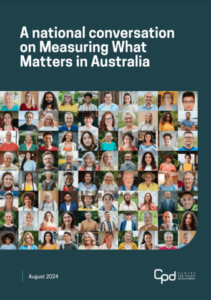 With the release of its Measuring What Matters framework the Australian Government has taken the first steps to embedding wellbeing in policy and decision-making. Critical to its success will be gaining the perspectives and buy-in of the Australian public. This paper provides the foundations to support the government and community sector to embark on a national conversation on Measuring What Matters. It explores the benefits of Australia engaging in a national conversation on wellbeing and outlines how it could be done successfully and suggests next steps for the process.
With the release of its Measuring What Matters framework the Australian Government has taken the first steps to embedding wellbeing in policy and decision-making. Critical to its success will be gaining the perspectives and buy-in of the Australian public. This paper provides the foundations to support the government and community sector to embark on a national conversation on Measuring What Matters. It explores the benefits of Australia engaging in a national conversation on wellbeing and outlines how it could be done successfully and suggests next steps for the process.
Supported playgroups as early intervention: what can we learn from the evidence? | Department of Communities and Justice (NSW)
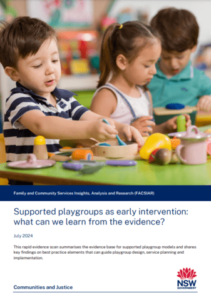 This report summarises the findings from a rapid evidence scan that explored the evidence base for supported playgroup models. The evidence base for supported playgroup models is emerging. The few quantitative evaluations available provide some evidence that supported playgroups can improve child outcomes, including language, cognition, behaviour, socialisation, transition to school; and parent outcomes, including attachment, responsiveness, and social connection.
This report summarises the findings from a rapid evidence scan that explored the evidence base for supported playgroup models. The evidence base for supported playgroup models is emerging. The few quantitative evaluations available provide some evidence that supported playgroups can improve child outcomes, including language, cognition, behaviour, socialisation, transition to school; and parent outcomes, including attachment, responsiveness, and social connection.
Overview of Aboriginal and Torres Strait Islander health status 2023 | Australian Indigenous HealthInfoNet
The Overview of Aboriginal and Torres Strait Islander health status 2023 (Overview) aims to provide a comprehensive outline of the current health status of Aboriginal and Torres Strait Islander people. The early sections of the Overview present information about the social and cultural context of Aboriginal and Torres Strait Islander health, social determinants, the structure of the population, and measures of population health including births, deaths and hospitalisations. In this version we have introduced a section for cultural indicators including language. This will be further developed as more data becomes available.
Want to submit something to the FRSA eBulletin?
If you have an news item or event that you would like to be featured in a future eBulletin please submit your announcement via the form below or email communications@frsa.org.au with the subject “FRSA eBulletin submission”.
Please note FRSA members receive priority for items posted in the eBulletin. And to keep information current, relevant and useful, submissions will not be repeated from week to week.
Subscribe
Subscribe to receive future eBulletin editions directly to your inbox!








